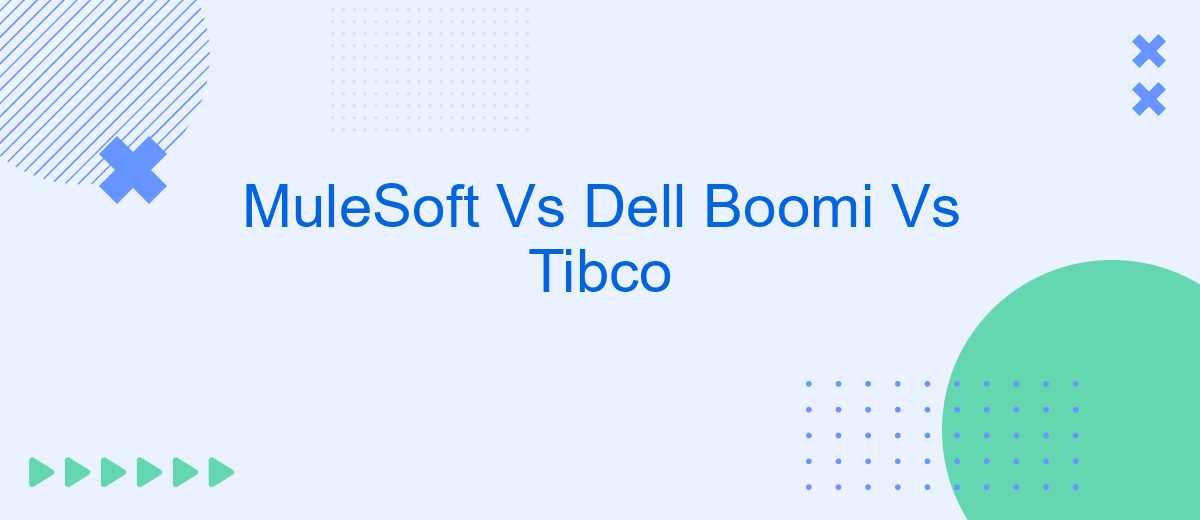In today's rapidly evolving digital landscape, businesses are increasingly seeking robust integration solutions to streamline operations and enhance connectivity. This article delves into a comparative analysis of three leading integration platforms: MuleSoft, Dell Boomi, and Tibco. By examining their features, capabilities, and unique advantages, we aim to provide insights that will help organizations make informed decisions in selecting the right tool for their needs.
Introduction
In today's rapidly evolving digital landscape, businesses are increasingly relying on integration platforms to streamline their operations and enhance connectivity between disparate systems. MuleSoft, Dell Boomi, and Tibco are three leading integration platforms that offer robust solutions for connecting applications, data, and devices. Each platform comes with its unique features and capabilities, making it crucial for organizations to understand their differences to make an informed decision.
- MuleSoft: Known for its API-led connectivity and comprehensive Anypoint Platform.
- Dell Boomi: Offers a cloud-native integration platform with extensive pre-built connectors.
- Tibco: Provides a wide range of integration and analytics tools with strong enterprise capabilities.
Choosing the right integration platform depends on various factors, including the specific needs of the organization, scalability requirements, and ease of use. By evaluating the strengths and weaknesses of MuleSoft, Dell Boomi, and Tibco, businesses can select the most suitable solution to drive their digital transformation initiatives. Additionally, services like SaveMyLeads can further simplify the integration process by automating lead data transfers and enhancing overall efficiency.
Features Comparison

MuleSoft, Dell Boomi, and Tibco each offer robust features for integration, but they cater to different needs and preferences. MuleSoft is known for its API-led connectivity approach, which allows for seamless integration across various platforms. It provides a rich set of tools for API management, design, and analytics, making it a strong choice for enterprises needing comprehensive API solutions. Dell Boomi, on the other hand, excels in its ease of use and low-code development environment. It offers pre-built connectors and a drag-and-drop interface, which significantly reduces the time and effort required to set up integrations. This makes it ideal for businesses looking for quick and efficient integration solutions without extensive coding knowledge.
Tibco focuses on real-time data integration and analytics, providing a robust platform for handling large volumes of data with minimal latency. Its strength lies in its ability to process and analyze data in real-time, making it suitable for industries where time-sensitive data is crucial. Additionally, services like SaveMyLeads can complement these platforms by offering automated lead integrations, helping businesses streamline their marketing and sales processes. SaveMyLeads provides an easy-to-use interface for connecting various marketing tools, ensuring that leads are captured and managed efficiently across different systems.
Pricing

When comparing the pricing models of MuleSoft, Dell Boomi, and Tibco, it is important to consider the specific needs and budget of your organization. Each platform offers a range of pricing tiers and packages designed to accommodate different levels of usage and functionality.
- MuleSoft: MuleSoft provides a subscription-based pricing model with different tiers based on the number of applications and data volume. They offer a free trial to get started.
- Dell Boomi: Boomi's pricing is also subscription-based, with tiers that vary depending on the number of connectors and integrations needed. They provide a 30-day free trial.
- Tibco: Tibco offers a flexible pricing model that can be tailored to the specific requirements of the business. They provide a range of plans, including cloud-based and on-premise options.
While these platforms provide robust integration solutions, services like SaveMyLeads can offer a more cost-effective alternative for businesses looking to automate their lead management processes. SaveMyLeads provides easy-to-use tools for integrating various applications, which can be particularly beneficial for small to medium-sized enterprises.
Use Cases and Success Stories

In the realm of integration platforms, MuleSoft, Dell Boomi, and Tibco have all demonstrated their capabilities through various use cases and success stories. Each platform has carved out a niche, providing solutions to complex integration challenges across different industries.
MuleSoft has been instrumental in helping companies like Spotify and Unilever streamline their API management and integration processes. Dell Boomi has empowered organizations such as LinkedIn and Novartis to achieve seamless data integration and application connectivity. Tibco, on the other hand, has enabled enterprises like NASA and Air France to harness real-time data for better decision-making.
- MuleSoft: Spotify, Unilever
- Dell Boomi: LinkedIn, Novartis
- Tibco: NASA, Air France
SaveMyLeads is another service that complements these integration platforms by providing a user-friendly interface for setting up and managing integrations. It simplifies the process of connecting various applications, making it easier for businesses to automate workflows and enhance productivity. This flexibility and ease of use have made it a valuable tool for companies looking to optimize their integration strategies.
Conclusion and Recommendations
In conclusion, MuleSoft, Dell Boomi, and Tibco each offer robust integration platforms with unique strengths. MuleSoft excels in API-led connectivity and a comprehensive Anypoint Platform, making it ideal for enterprises with complex integration needs. Dell Boomi stands out for its ease of use, rapid deployment, and extensive pre-built connectors, catering well to mid-sized businesses and those looking for quick, efficient integration solutions. Tibco, with its strong focus on real-time data processing and analytics, is perfect for organizations requiring high-performance integration capabilities and advanced data management.
When choosing the right integration platform, it's crucial to consider your specific business requirements, technical expertise, and budget. For businesses seeking an additional layer of simplicity and automation in their integration processes, services like SaveMyLeads can offer valuable support. SaveMyLeads automates data transfer between various applications, reducing manual efforts and enhancing workflow efficiency. Ultimately, the best choice will depend on aligning the platform's capabilities with your organization's strategic goals and operational needs.
- Automate the work with leads from the Facebook advertising account
- Empower with integrations and instant transfer of leads
- Don't spend money on developers or integrators
- Save time by automating routine tasks
FAQ
What are the key differences between MuleSoft, Dell Boomi, and Tibco?
Which platform is more suitable for small to medium-sized businesses?
How do these platforms handle real-time data integration?
What are the common use cases for MuleSoft, Dell Boomi, and Tibco?
Are there services available to help implement these integration platforms?
If you use Facebook Lead Ads, then you should know what it means to regularly download CSV files and transfer data to various support services. How many times a day do you check for new leads in your ad account? How often do you transfer data to a CRM system, task manager, email service or Google Sheets? Try using the SaveMyLeads online connector. This is a no-code tool with which anyone can set up integrations for Facebook. Spend just a few minutes and you will receive real-time notifications in the messenger about new leads. Another 5-10 minutes of work in SML, and the data from the FB advertising account will be automatically transferred to the CRM system or Email service. The SaveMyLeads system will do the routine work for you, and you will surely like it.

